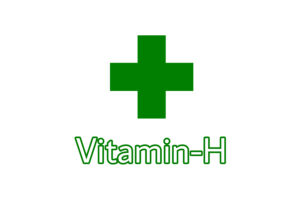
Vitamins are essential micronutrients needed by our bodies to support growth, energy production and overall health. One important vitamin is vitamin H, commonly known as biotin. This vitamin is considered extremely beneficial for skin, hair, nails and metabolism.
The “H” in vitamin H is derived from the German words Haar (hair) and Haut (skin), reflecting its importance in beauty and health. In this article, we’ll learn what vitamin H is, its natural sources, benefits, deficiency symptoms, daily requirement and why it’s essential in our diet.
What is Vitamin H (Biotin)?
Vitamin H or biotin is a water-soluble B-complex vitamin (Vitamin B7). It helps the body convert carbohydrates, proteins and fats into energy.
Because biotin isn’t stored in the body, it must be consumed daily through diet. It’s also known as the “beauty vitamin” due to its positive effects on hair, skin and nails.
Natural Sources of Vitamin H
Biotin is found in a variety of foods, especially protein-rich and plant-based foods.
🥚 Animal-based sources
- Egg Yolk – Best Source of Vitamin H
- Liver and kidney – rich in biotin and other B vitamins
- Fish (salmon, tuna, sardines)
- Meat (chicken, beef, pork)
- Dairy products – milk, yogurt, cheese
🌱 Plant-based sources
- Nuts and seeds – almonds, peanuts, walnuts, sunflower seeds
- Whole grains – oats, barley, brown rice, wheat germ
- Pulses – soybean, chickpeas, lentils
- Vegetables – sweet potatoes, spinach, broccoli, cauliflower
- Fruits – bananas, avocados, berries
Other sources
- Brewer’s yeast
- Mushroom
- Fortified Foods and Supplements
Health Benefits of Vitamin H (Biotin)
1. Strengthens and thickens hair
Biotin helps produce keratin protein, which makes hair stronger, shinier, and thicker. This can help reduce hair loss.
2. Makes skin healthy
A deficiency in vitamin H can cause dry and dull skin. Adequate biotin provides moisture, radiance, and elasticity to the skin.
3. Strengthens nails
Weak and brittle nails can be a sign of a biotin deficiency. Regular consumption of biotin helps strengthen nails.
4. Boosts metabolism and energy
Biotin activates enzymes that convert food into energy, thereby reducing fatigue.
5. Controls blood sugar
It may help with type 2 diabetes by improving glucose metabolism.
6. Improves mental health
Vitamin H helps with neurotransmitter function, which improves memory and concentration.
7. Beneficial in pregnancy
Biotin helps in the development of the fetus during pregnancy.
8. Supports heart health
It helps in keeping cholesterol balanced, which keeps the heart healthy.
Recommended Intake of Vitamin H
- Infants (0–12 months): 5–6 mcg
- Children (1–8 years): 8–12 mcg
- Teenagers (9–18 years): 20–25 mcg
- Adults: 30 mcg
- Pregnant women: 30 mcg
- Breastfeeding women: 35 mcg
Symptoms of Vitamin H Deficiency
- Hair loss
- dry and scaly skin
- brittle nails
- Fatigue and weakness
- Depression and mood swings
- Tingling in hands and feet
Vitamin H supplements
When you don’t get enough biotin from your diet, supplements can be used. These are available in the form of tablets, capsules, gummies and hair products. They should be taken with a doctor’s advice.
Also read this post :- Vitamin A or ( Retinoic Acid, Retinol ).
Conclusion
Vitamin H (Biotin) is an essential nutrient that is crucial for hair, skin, nails, and overall health. You can easily reap its benefits by including biotin-rich foods in a balanced diet. Supplements may also be useful if needed.
For a healthy life and natural beauty, include Vitamin H in your daily diet.
Frequently Asked Questions (FAQs)
Vitamin H is also known as biotin. This is vitamin B7, which is essential for hair, skin, nails and metabolism.
Vitamin H deficiency can cause hair loss, dry skin, brittle nails, fatigue, depression and tingling in the hands and feet.
Biotin is found in egg yolks, nuts, seeds, whole grains, pulses, bananas, spinach, mushrooms and dairy products.
Vitamin H increases keratin protein, which makes hair stronger, thicker and shinier and reduces hair fall.
For adults, 30 mcg per day is sufficient, while breastfeeding women need 35 mcg.
Yes, biotin is safe when taken in appropriate amounts. However, it’s important to consult a doctor before taking larger doses.
Vitamin H does not directly reduce weight, but helps in energy production by improving metabolism.
Yes, vitamin H is essential for fetal development during pregnancy. It should be taken only after consulting a doctor.
